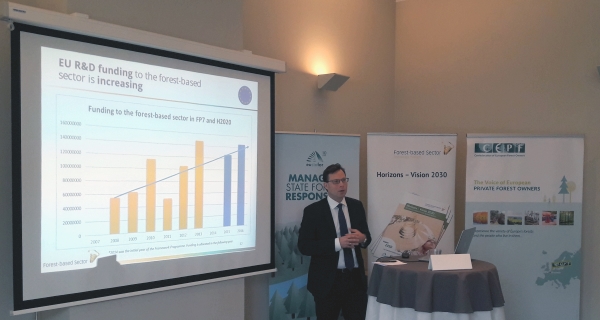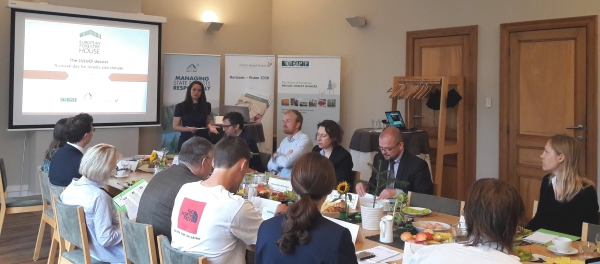FTP seeks to align public funding for research and innovation with proper technological developments to reduce GHG emissions and improve forest management and land use
With its unique innovation portfolio and many technological solutions, the forest-based sector can foster the transition to a reliable, sustainable and competitive energy system and contribute to reducing the emission of greenhouse gases (GHG), while improving sustainable land use and forest management. This message was delivered to journalists by Johan Elvnert, Managing Director of FTP, at a meeting today at the European Forestry House (EFH), in Brussels. Discussions focused on the implications of the Land Use, Land-Use Change and Forestry (LULUCF) regulation, following the vote of the European Parliament Committee on Environment that took place on 11 July 2017.

“It is FTP’s role to inform the European Commission where the technological bottlenecks are and what solutions the forest-based sector can offer to address pressing societal concerns”, explained Elvnert in relation to FTP’s advisory role in shaping EU funding for research and innovation. The sector can sustain the transition to a low-carbon green economy by supplying additional forest biomass to the market. To achieve this, the forest-based sector will need to sustainably increase harvesting possibilities in Europe by 30% up to 2030. “FTP contributes to this endeavour by ensuring that EU funding for innovation meets such targets”, he added.
Since its launch in 2014, the EU Research and Innovation Framework Programme Horizon 2020 has funded more than 30 research and innovation projects in the sector, which cover aspects of enhanced biomass production, efficient use of wood, and responsible management of forest resources. For Elvnert, this fact demonstrates that public authorities are confident that the sector can deliver innovative solutions.

“The mitigation potential of the sector goes beyond the carbon sinks in our forests. Carbon is stored in all harvested wood products and in many innovative biobased materials that have the potential to substitute fossil-based materials, fuels and products. Building new, wood-based buildings and cities is the smartest way to use materials with low embodied energy, and thus, fulfil the Paris Agreement”, he concluded.
During the event, the Secretary-General of the Confederation of European Forest Owners (CEPF), Emma Berglund, and the Executive Director of the European State Forest Association (EUSTAFOR), Piotr Borkowski, also shared their reactions to the vote of the Environment Committee.
For further enquiries, please contact:
Ms Thaís Mattos
Communications & Project Officer, FTP
T: +32 (0) 2 239 2308
M: +32 (0) 484 90 44 09
Email: thais.mattos@forestplatform.org

